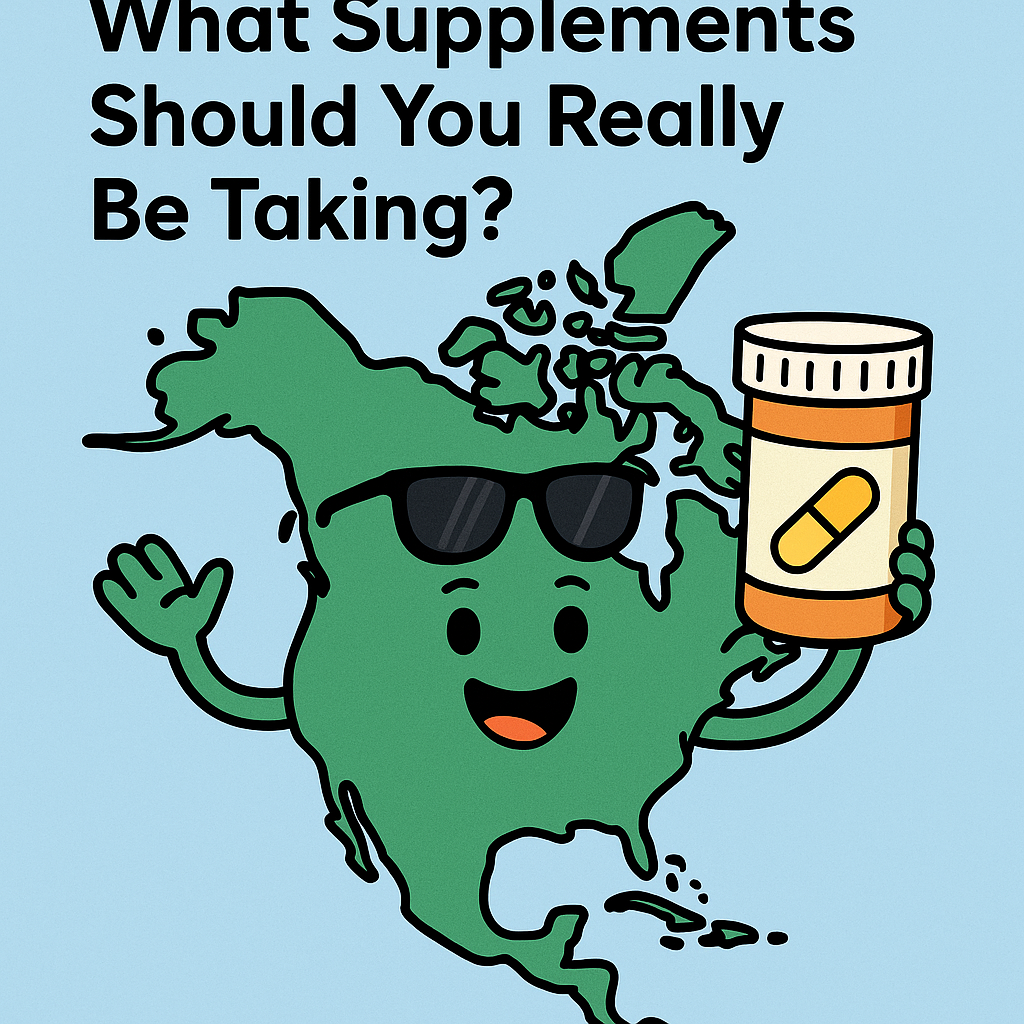💊 What Supplements Should You Really Be Taking? A Science-Backed Guide for North Americans

Health & Sciences | The Varrock Street Journal
What is happening Varrock Street Community!?
If you've ever stood in front of a vitamin aisle, unsure whether to grab the D3, the multivitamin, or the super greens powder, you're not alone. The supplement industry is worth over $50 billion in North America, but how much of it is actually necessary?
Today, we’re cutting through the hype and diving into what science actually recommends for vitamin and nutrient supplementation—especially for those living in the U.S. and Canada. We’ll also highlight how geography and lifestyle play a surprising role in what your body might be missing.

🧬 What the Research Says About Daily Supplement Needs
Most people who eat a balanced diet with fruits, vegetables, lean protein, and whole grains can get most of their nutrients through food. But in real life? Many North Americans don’t meet those guidelines—and the following supplements are the most commonly recommended by health professionals:
1. Vitamin D
- 🔅 Why it matters: Supports bone health, immune function, and mood.
- 🧭 Why we need it in North America: Many people, especially those in northern states and Canada, don’t get enough sun exposure—especially in winter.
- 💊 Typical dose: 600–2000 IU/day depending on sun exposure and individual needs.
2. Vitamin B12
- 🧠 Why it matters: Essential for nerve function and red blood cell production.
- 🍽️ Who needs it most: Vegetarians, vegans, adults over 60, and those with certain gut disorders (e.g., celiac or Crohn’s).
- 💊 Typical dose: 250–500 mcg/day (or monthly injections if deficient).
3. Omega-3 Fatty Acids
- ❤️ Why it matters: Supports heart health and reduces inflammation.
- 🐟 Who’s at risk: People who don’t eat fatty fish at least twice a week.
- 💊 Typical dose: 250–1000 mg EPA/DHA daily.
4. Magnesium
- 💪 Why it matters: Helps with muscle function, sleep, and blood sugar regulation.
- 🍞 Who’s at risk: People with poor diets, high stress, or GI issues.
- 💊 Typical dose: 200–400 mg/day (watch for diarrhea with higher doses).
5. Folate (Vitamin B9)
- 🤰 Why it matters: Vital for fetal development and cell function.
- 🌿 Who needs it: People trying to conceive, pregnant individuals, and those with poor dietary intake.
- 💊 Typical dose: 400–800 mcg/day.
🌎 Fun Geographic Twist: Where You Live Affects What You Need
🌨️ Northern Regions (e.g., Minnesota, Ontario, British Columbia)
Less sunlight = higher risk of vitamin D deficiency, especially in fall and winter.
🌵 Southwestern U.S. (e.g., Arizona, New Mexico)
Higher risk of dehydration and electrolyte loss—magnesium and potassium from food or supplements may help.
🌽 Midwest (e.g., Nebraska, Iowa)
High-carb, grain-heavy diets may lead to low fiber and magnesium intake, and often low omega-3s.
🏙️ Urban Areas
Indoor lifestyles reduce natural sun exposure → more people need vitamin D and B12.
🌊 Coastal Regions (e.g., California, East Coast)
Access to fresh seafood = generally higher omega-3 intake—but still may benefit from supplements if intake is inconsistent.
❗ Supplements You Probably Don’t Need
- Excessive multivitamins: Many people double-dose and end up with too much of certain nutrients.
- “Superfood powders”: Often expensive and not more effective than eating whole fruits and vegetables.
- High-dose antioxidants (like mega-vitamin C or E): May not provide extra benefit and can sometimes interfere with medications or body functions.

🧠 Why This Matters
Supplements can be life-changing for those who need them—but unnecessary or excessive use can waste money and even cause harm. Understanding your personal needs, diet, age, and lifestyle helps guide smart decisions about what to take—and what to skip.
Here is a podcast diving into this topic if you want to learn more!
🌟 Spotlight on the Future
- Personalized supplement subscriptions based on blood testing and AI-driven health tracking are growing in popularity.
- DNA-based nutrition reports may soon tailor supplements to genetic needs.
- Sustainable supplements (like algae-based omega-3s) are making science-backed nutrition more eco-friendly.
😲 Did You Know?
- Up to 42% of Americans are vitamin D deficient in winter.
- B12 deficiency affects nearly 20% of adults over 60.
- The FDA does not regulate supplements as strictly as medications—so always choose trusted brands.
🧠 Reflection Questions
- Have you ever taken a supplement without knowing whether you really needed it?
- How could geography or diet be influencing your body’s nutrient levels right now?
- What’s one small dietary change you could make before turning to a supplement?
👋 Final Thoughts
The best supplement strategy isn’t one-size-fits-all. It’s smart, simple, and science-backed. With the right knowledge and intention, supplements can fill the gaps—not your entire plate.
📚 References
- National Institutes of Health. (2024). Vitamin and Mineral Supplement Fact Sheets. https://ods.od.nih.gov
- Harvard T.H. Chan School of Public Health. (2024). Should I Take a Daily Multivitamin? https://www.hsph.harvard.edu
- Health Canada. (2024). Nutrition and Supplements. https://www.canada.ca
- Mayo Clinic. (2024). Vitamins and Supplements Guide. https://www.mayoclinic.org
📲 Stay nourished with us:
- Instagram: @thevarrockstreetjournal
- TikTok: @varrock.street.jo
